In the heart of Tuscany the age-old rite of the hunt for wild boar rages long and lethal. Every Saturday and Sunday from November through January hunters converge in the hilly country spreading beyond the shadow of Siena’s Duomo. Men gather—no women in their number—with dogs and rifles, knives and bullets, walkie talkies and cell phones. Outfitted with modern equipment, today’s hunters are but a few in the long line that stretches back through the Renaissance and the Middle Ages to the days of Caesar and Odysseus. Ancient Roman reliefs depict boar hunts, while one tale recounts how the ancient Greeks baptized an island in honor of the beast; this was Kapros, now called Capri.
This morning, to one side of Monte Maggio, or May Mountain, men section off fields and cassocks, swells and dips. They pull numbers from a bag, assigning post to pursuant. Then the fifty or more shooters, tiratori in their camouflage, wind through the woods. For kilometers they tramp, then for hours they wait in their appointed spots along one side of the drifts and dales, rifles skyward. When a boar draws near they shoot ahead, never sideways, where fellow tiratori hide. No friendly crossfire tolerated. Meanwhile, twelve canai, doghandlers with their packs of sniffing hounds and growling terriers, park their jeeps on the far side of the woods and set off across the expanse toward the line bristling with tiratori. Scouring and routing, the men and their dogs startle and flush the boar, propelling them forward.
On the periphery of this elaborate orchestration today: my father-and law and I. I’m armed with my camera and am tolerated only because my father-in-law is a hunter of long standing. “We don’t want to end up on the front page of the animal rights group paper,” his comrades say in jest, but just barely, when they learn that he’s brought me here to take photos of the hunt. Siena with its Palio where horses are often injured in the famous race around the square in town already attracts a fair share of unwanted attention by animal rights advocates.
Today the canai’s dogs rootle through the woods above Celsa castle. The owner is an Aldobrandini prince who lives in Rome. Weathered marine pine line the avenue to the entrance. Someone has opened a couple of windows facing the sun. In the summer the castle is open to the public but now I wonder if the prince has come to his country estate for Christmas vacation. Or perhaps a maid is simply airing mildew out of the stony rooms on a bright and sunny winter’s day.
Hounds howl and bark and then several shots ring out. One who has lost the scent emerges onto the road near the abandoned carabinieri station that once controlled the area. When Monte Maggio was a tougher place, three-quarters of a century or more ago, bandits lurked here and the carabinieri chased them. After that, during the war, partisans hid in the caves. The Black Shirts and Germans hunted them.
The dog runs in circles, nose to the pavement. A woman in a Jeep spots it. She tries to lure it into her vehicle with a length of jerky.
“Scandalous,” she says. “Poor dog could get hit out here on the road.”
My father-in-law suspects she’s part of an animal rights group. He thinks she’s trying to sabotage the hunt by rounding up the dogs.
“But I bet she eats meat,” he says. “Probably pappardelle with wild boar. Take a picture of her license plate.” Then he pulls out his phone and calls il duca—the duke—one of the canai. The man’s not really a duke; it’s a nickname he’s earned one way or another. I suspect it has something to do with his less than genteel ways.
“A lady’s trying to lure one of the hounds into her car,” my father-in-law says. “Over here, on the road by the carabinieri station. We’ve got her license plate number. But maybe you should send someone over.”
I can hear il duca cursing into my father-in-law’s ear. No run of the mill obscenities though; he insults saints and the Virgin. Then he wants to speak to the lady. My father-in-law passes the phone over. It turns out that il duca and the lady know each other.
“Okay, I won’t. But get it off the road,” she says into the phone. In the meantime, the hound has already run off, back into the woods, having found the scent.
My father-in-law started hunting here when he was eighteen. Sixty-seven years he’s been hunting. At first, he hunted for hare and pheasant. He kept his own bird dogs—Jack and Tom, English names for Italian hounds—in a pen behind an old stone farmhouse. Then in the sixties when boar populations grew and overran the woods, he gave up Jack and Tom and turned to boar hunting. He loves the woods out here on Monte Maggio. He knows every centimeter. He comes when it rains, when it snows, when it’s warm and sunny like today. He’ll still keep coming as long as he’s able. He’s not sure how much longer that will be. He won’t think yet about when the hike, the interminable wait, the bad weather and the mountain itself will conspire to keep him home.
He goes to the woods for the peace, he says, and for the camaderie after. But best is when he’s the one to bag the prey. You can tell when the boar approaches. The dogs’ howling grows loud, the brush and bramble tremble. You take up your gun and aim, but only when you see the boar’s dark eyes. If you shoot into the waving thicket you risk killing a dog. You face that beast—black and fierce and angry, ringed by thirty or more frenzied dogs.
I imagine the jolt. I think the hunter’s heart must whip like pine boughs in a windstorm.
“No,” says my father-in-law, “it’s not like that. At least not for me anymore. You feel a strange sensation, but it’s more wrapped up with blood and life, the ebb and flow.”
“I see,” I say even if I don’t quite.
We find a break in the woods. “Here,” my father-in-law says. The hunters will pass by on their way back to their cars, parked on the rim of the road behind us. “We’ll wait here. Then you can shoot them as they hike through.” He grins. He likes how we’ve turned the tables on the hunters. I grin back.
We wait. Then we wait some more. While we wait we pull ivy off old oak and pine. Bark flies, red bugs scuttle, the air fills with sap, the sun shines through branches in filmy snatches. “Is this what it’s like,” I ask him, “when you’re a tiratore? Do you tend to the trees then too?”
“No,” he says. “Not when you’re stalking boar. You can’t make noise. You can’t smoke. You can’t eat. You can’t even pee. You wait ever so quietly for that one brief moment when you squeeze off a shot.”
After an hour or more, we hear voices. Men surge forward. One short, chubby hunter, a middle-aged man nicknamed Smilzo, or Skinny, drags a small boar up the path. My father-in-law thinks Smilzo’s boar may weigh 30 kilos—if that. Since Smilzo shot it, he will get the ears, tail, heart, liver, kidneys, lungs and tusks in addition to his share of the meat which will be divided equally among all hunters present. “In Tuscany,” he says “no part of the boar goes to waste. Make sure you write that.”
We follow the hunters to their shack in the woods. They roast sausage and steaks they brought from home, drink Chianti and exchange tall tales. My father-in-law recounts how we rescued several dogs from an army of animal rights do-gooders. Listening, il duca insults several more saints. Smilzo describes how his boar almost tore his leg off. Feroce, or Ferocious, a small man whose real name no one remembers, scoffs. Burlacche, or Wiseass, jokes about Smilzo’s small boar and how it couldn’t have torn off a toenail.
Butchers gut and section the carcasses. Hunters light cigars, cigarettes and pipes. Hounds wait in small trailers, their noses poking out through bars. Two canai discuss returning to the woods with their dogs to look for a boar that someone swears is wounded.
My father-in-law’s cell phone rings. It’s my mother-in-law. She’s been keeping lunch for us even though it’s almost 4 p.m.
“You get what you need?” my father-in-law asks. I nod. We say goodbye to il duca, Smilzo, Feroce, Burlacche. On the way home he tells me the menu. Polenta with stewed wild boar that he shot last season.
“Okay,” I say. I realize I’m hungry after hours of tramping through the woods. Eating the kill is part of the ritual. And my mother-in-law is an ace at stewing boar. It’s fiery and rich; red pepper in the sauce is one of her secret ingredients, a tribute of sorts to the animal itself.
When my father-in-law and I first met, he wasn’t sure how he felt about having a foreigner in the family. I wasn’t sure how I felt about someone who thought killing was a sport. Over the years we’ve gotten to know each other. Now he’s warm and proud to show me where he loves to spend his weekends from November through January. And I’m glad to have had the chance to witness this chapter in his life, one that won’t go on forever.
—Natalia Sarkissian
Natalia Sarkissian has an MFA in Writing from Vermont College of Fine Arts and has been an editor and contributor at Numéro Cinq since 2010. Natalia divides her time between Italy and the United States.
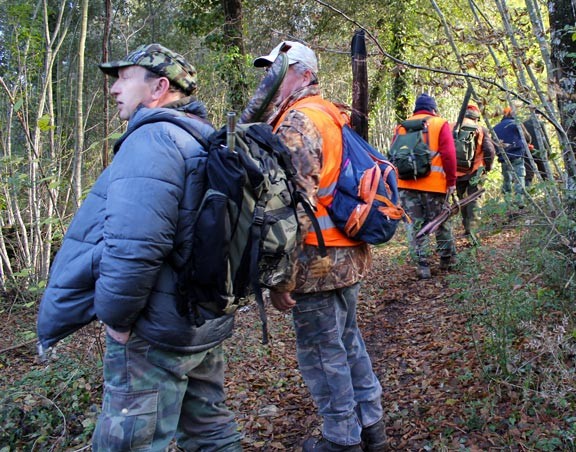
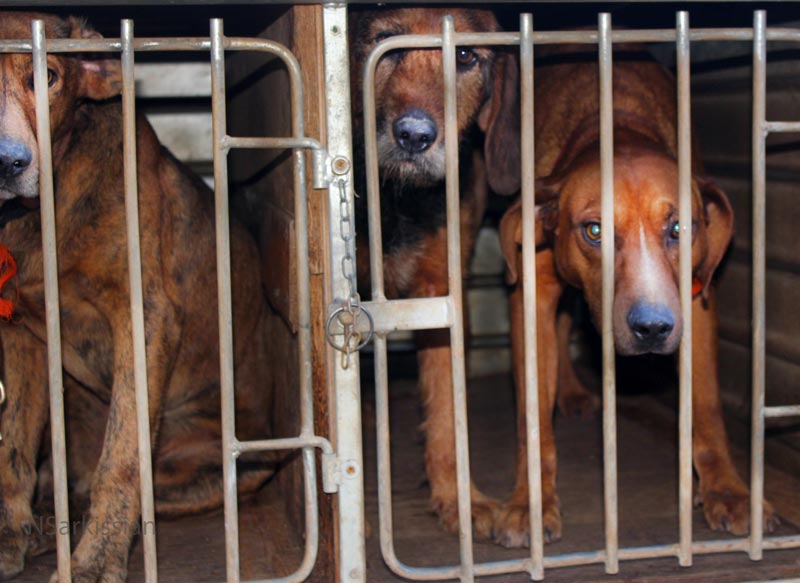
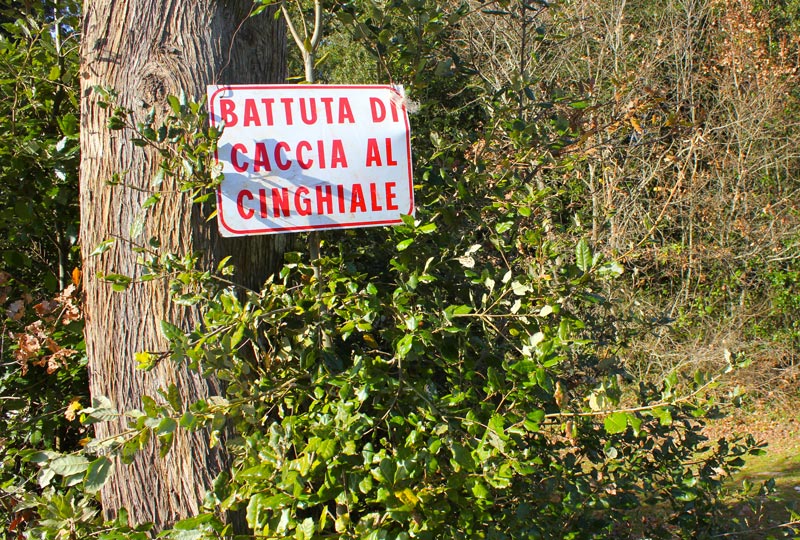

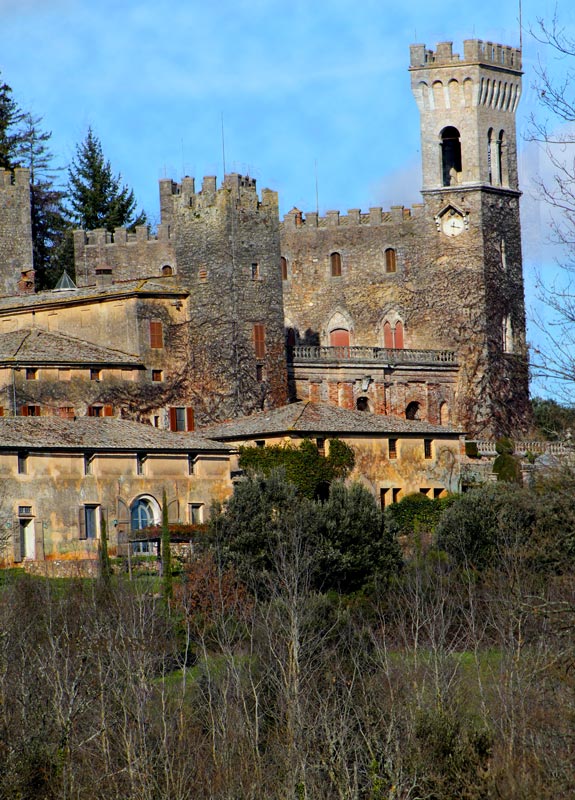
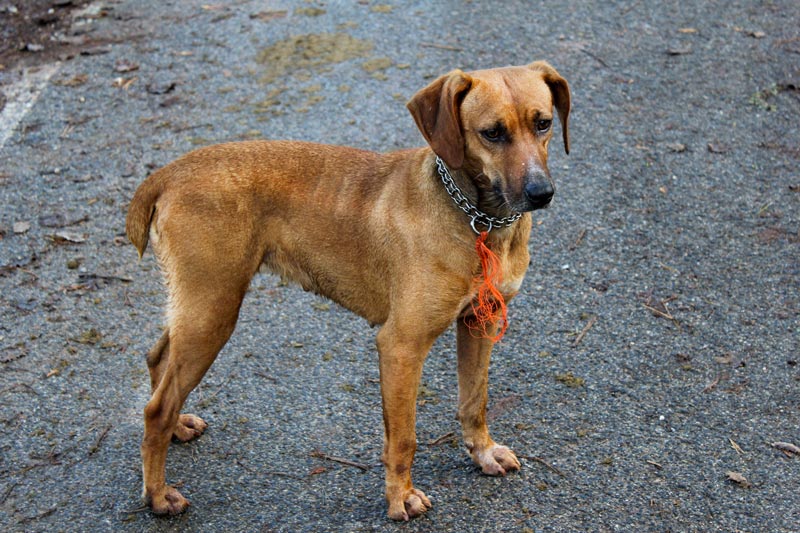
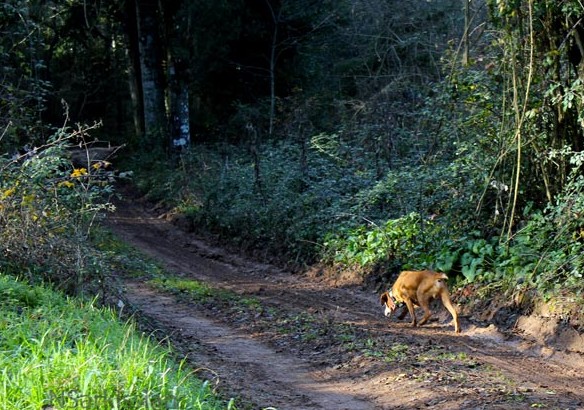
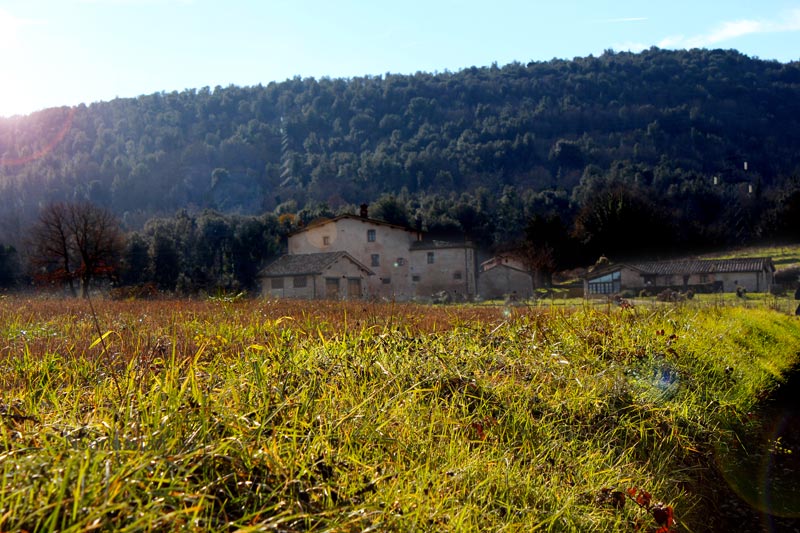

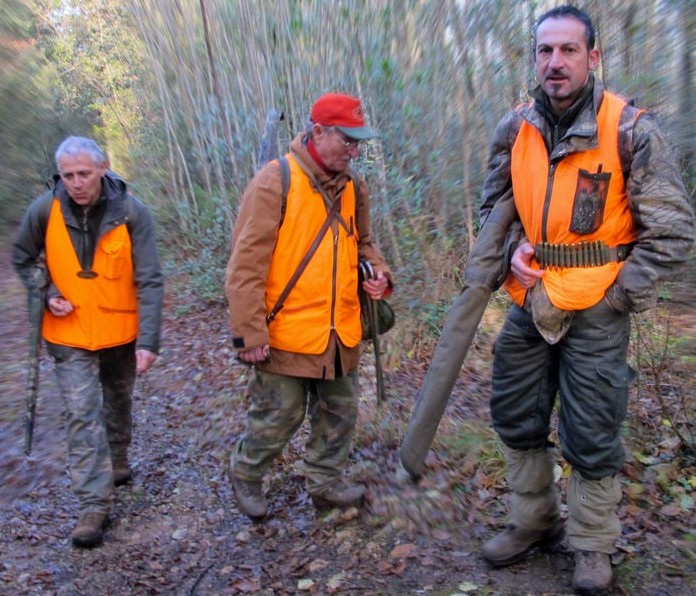
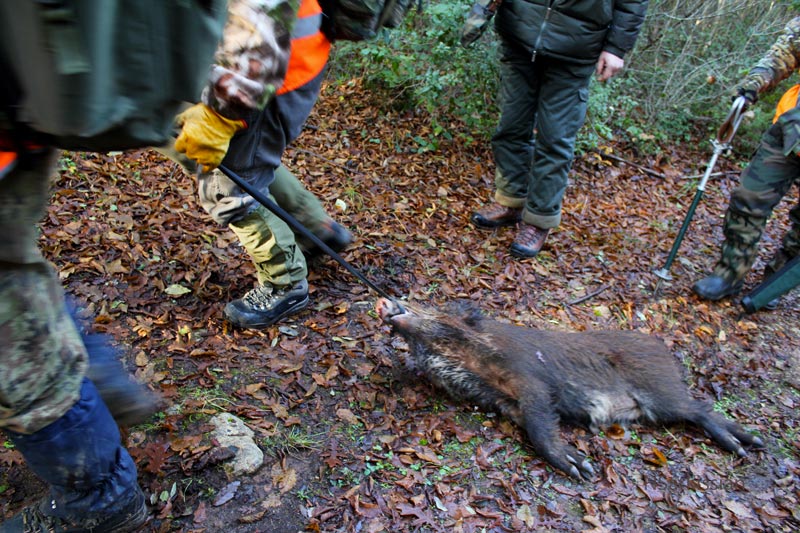
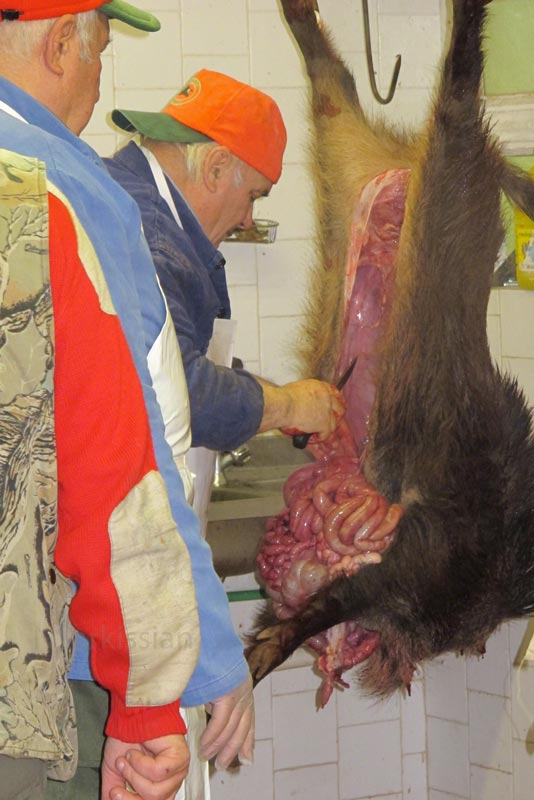
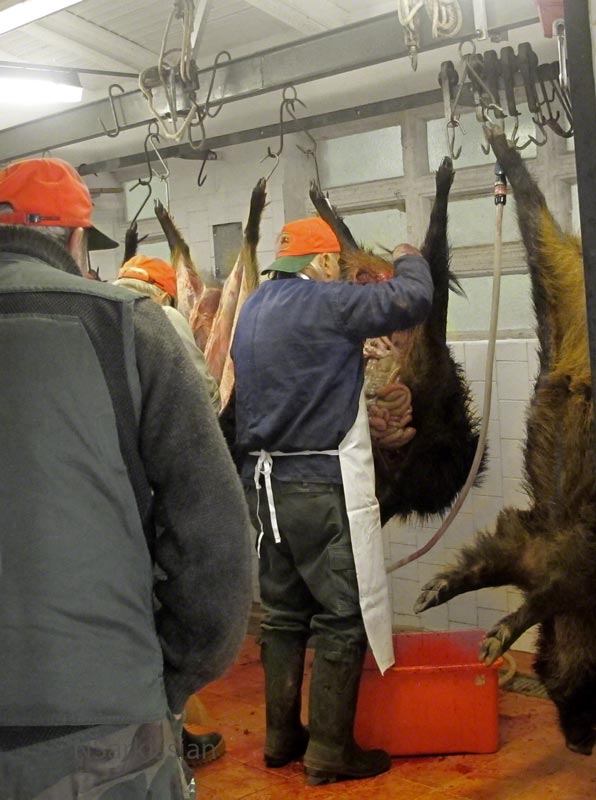
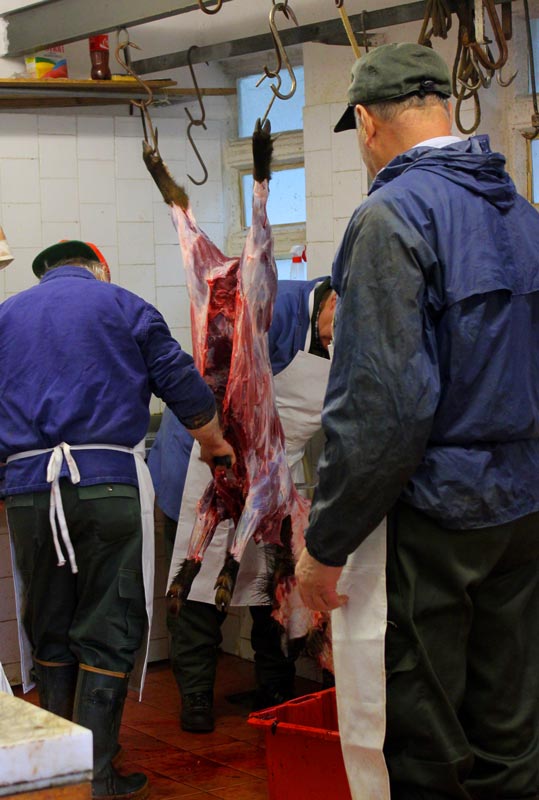
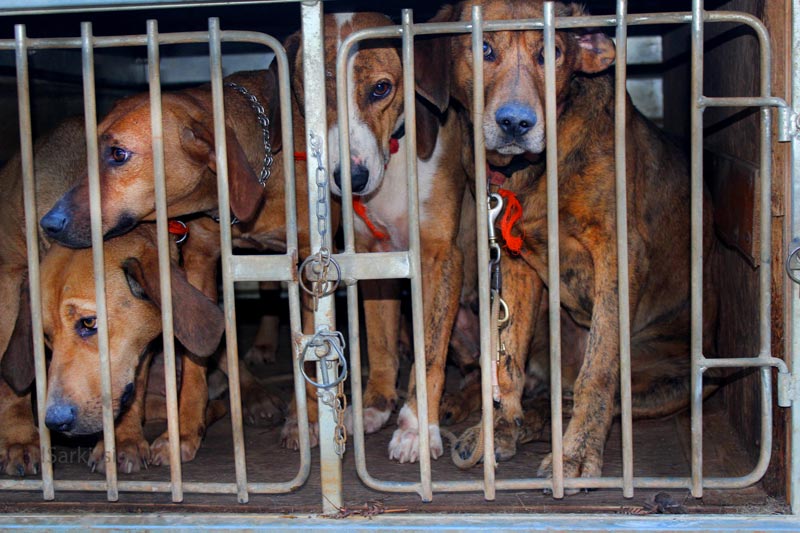

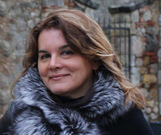
Natalia,
As usual, a beautifully balanced piece, with great photographs. I don’t know if I’d want to hang around with most of these guys, but you were great company on the hunt.
Glad you came along and enjoyed it, Pat.
Natasha, you stun me every time.
Thanks, Diane!
This is an interesting and well written essay. Those who have not seen it up close can’t imagine the passion that goes into this hunt– along with ritual, reverence for ancestors, and so on. My one small quibble is that the Italian word for boar is “cinghiale,” not “capri,” which exists only as the proper name of the island. Great stuff, despite the pedantry on my part!
You’re right, Sydney, the sentence was misleading.
Thanks.
I’ve missed reading your work, NS, and found my way back…
Vivid photos and a bold topic. You bring forth the pov of your father-in-law and his friends without judgment, with a sense of respect for tradition alongside a sense of “surreal” yet not detached reservation. As the reader, I experienced a nuanced duality of an outsider/insider “allowed” to witness and document this ancient tradition.
Jeanette,
Great to hear from you again and thank you for your insightful comments.
Natalia